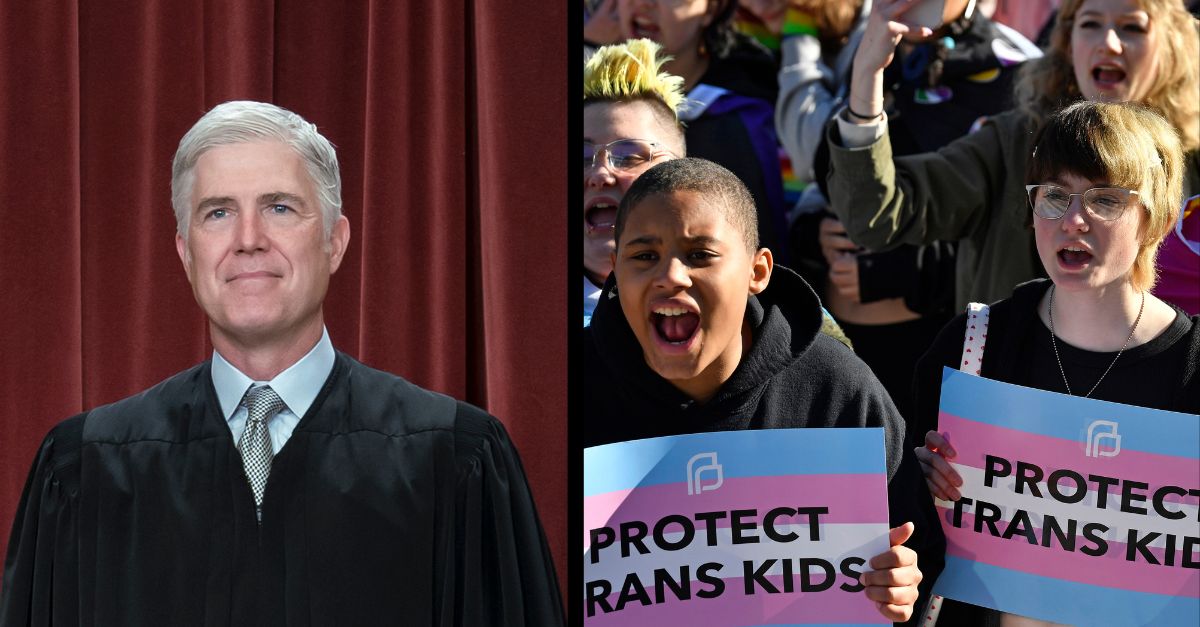
Left: Associate Justice of the Supreme Court Neil Gorsuch (Erin Schaff-Pool/Getty Images). Right: FILE – Protesters of Kentucky Senate Bill SB150, known as the Transgender Health Bill, cheer on speakers during a rally on the lawn of the Kentucky Capitol in Frankfort, Ky., March 29, 2023 (AP Photo/Timothy D. Easley, File).
The Biden administration filed an emergency petition with the U.S. Supreme Court on Monday in which it asked the justices to temporarily block two lower court orders that prohibit the federal government from enforcing its new rule against sex discrimination. In its filing, the government leaned hard on the words of Justice Neil Gorsuch in two recent cases — one that supported a reading of sex discrimination to include transgender status and the other that rejected the entire idea of nationwide injunctions.
In its petition, the administration urged the justices to at least allow portions of the law — such as those meant to protect pregnant and lactating students — to stay in place while challenges to the portions involving gender identity proceed.
The underlying cases were filed in Louisiana, where that state was joined by the Mississippi, Montana, and Idaho as plaintiffs, and Kentucky, where that state along with Tennessee, Ohio, Indiana, Virginia, and West Virginia are plaintiffs. The lawsuits challenged a 2024 rule implementing Title IX of the Education Amendments of 1972 following Supreme Court’s 2020 decision in Bostock v. Clayton County, a landmark 6-3 ruling in which Gorsuch said civil rights protections for “sex” extend to sexual orientation and transgender status.
In Bostock, Gorsuch wrote that it is “clear” that “[a]n employer who fires an individual for being homosexual or transgender fires that person for traits or actions it would not have questioned in members of a different sex,” which is, “exactly what Title VII forbids.”
The district courts in both Louisiana and Kentucky, however, blocked the federal agencies from enforcing any part of the rule in June. In mid-July, the U.S. Courts of Appeals for the Fifth and Sixth Circuits almost entirely rejected the federal government’s request to temporarily enforce the rule — which is set to go into effect Aug. 1.
The Biden administration responded with a pair of emergency appeals Monday in which U.S. Solicitor General Elizabeth Prelogar asked the justices to step in and allow enforcement of at least some portions of the 2024 rule.
Prelogar argued that the states’ challenges to the rule are simply too narrow to justify blocking the entirety of the rule. The states challenged the rule’s treatment of transgender students and employees, but the regulation is an “omnibus” rule, most of which is does not relate to gender identity, the brief said.
Prelogar noted that the rule in question addresses protections unrelated to gender identity, such as requiring access to lactation spaces and refrigeration for storing breast milk, mandating accommodations such as restroom breaks for pregnant students, and strengthening the legal rights of parents and guardians. By contrast, she argued, the state challenges focus only on the provisions related to discrimination on the basis of gender identity.
Prelogar also argued that the rule’s separate provisions were meant to stand independently, thereby rendering them severable. The correct remedy would therefore be to enjoin only select portions of the rule, she said, deriding the lower court’s broad ruling as a “blunderbuss approach” that is “both wrong and consequential.”
In the filing, the federal government reminded the Court of its April 2024 ruling in Labrador v. Poe. In Gorsuch’s concurrence joined by Justices Clarence Thomas and Samuel Alito, the Court’s most conservative flank concurred in a stay that narrowed an injunction and rejected “universal” injunctions more generally.
“In Labrador, multiple members of the Court thus recognized that a preliminary injunction goes too far when it reaches provisions of a law with which the plaintiffs have not ‘engage[d],”” wrote Prelogar, encouraging the justices to reject the sweeping injunctions granted by the courts below.
Separate challenges to the 2024 rule are also pending in several other states.
The Biden administration’s filing comes at a time when the justices are on summer recess. However, as part of the high court’s emergency docket, the justices could decide grant or deny the government’s request in the coming days.
Have a tip we should know? [email protected]








